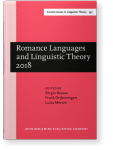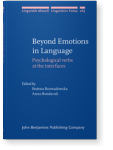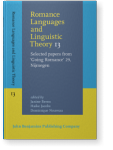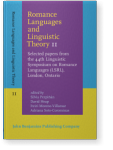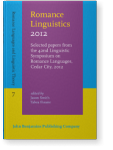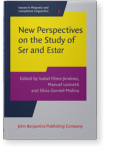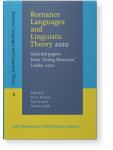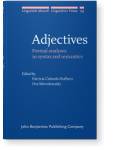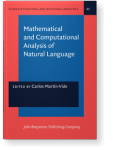Rafael Marín
List of John Benjamins publications for which Rafael Marín plays a role.
2021 Chapter 10. Aspect in the acquisition of the Spanish locative paradigm by Italian L2 learners Romance Languages and Linguistic Theory 2018: Selected papers from 'Going Romance' 32, Utrecht, Drijkoningen, Frank, Sergio Baauw and Luisa Meroni (eds.), pp. 191–204 | Chapter
The present study investigates the development of the expression of the locative paradigm in the L2 Spanish of Italian-speaking learners. We investigate (i) whether the developmental stages proposed for English-speaking learners (VanPatten 1987; Perpiñán, Marín & Moreno Villamar 2020) hold for… read more
2020 Chapter 4. Initiators, states and passives in Spanish psych verbs Beyond Emotions in Language: Psychological verbs at the interfaces, Rozwadowska, Bożena and Anna Bondaruk (eds.), pp. 113–140 | Chapter
The goal here is twofold: the first one is to point out the existence of at least two classes of Object Experiencer psychological verbs (henceforth, OEPV) in Spanish with respect to their passive behavior, casting doubt on Landau (2010), who proposes that passivization of OEPVs correlates with the… read more
2018 Spanish adjectives are PathPs Romance Languages and Linguistic Theory 13: Selected papers from ‘Going Romance’ 29, Nijmegen, Berns, Janine, Haike Jacobs and Dominique Nouveau (eds.), pp. 111–126 | Chapter
The goal of this contribution is to explore the hypothesis that not all
languages that have a lexical open class of adjectives project them
syntactically as the same kind of object. Specifically, we will argue that
Spanish adjectives syntactically project their scales as PathPs, while
English… read more
2018 Spanish estarse is not only agentive, but also
inchoative Romance Languages and Linguistic Theory 13: Selected papers from ‘Going Romance’ 29, Nijmegen, Berns, Janine, Haike Jacobs and Dominique Nouveau (eds.), pp. 209–224 | Chapter
This article explores the properties of constructions involving the stage
level copula estar with the pronominal form
se, which has been argued to encode an agentive
component lacking from the non se-marked form. While several previous
studies have argued that estarse constructions involve… read more
2017 Chapter 2. Towards a unified treatment of Spanish copulas Romance Languages and Linguistic Theory 11: Selected papers from the 44th Linguistic Symposium on Romance Languages (LSRL), London, Ontario, Perpiñán, Silvia, David Heap, Itziri Moreno-Villamar and Adriana Soto-Corominas (eds.), pp. 33–52 | Chapter
This paper sets the basis for a uniform account of the alternation between the two Spanish copulas (ser and estar) in adjectival and passive clauses. While the copular contrast has been attributed to the different properties of adjectives (e.g. individual vs. stage level) and to an eventive vs.… read more
2015 On the edge: Nominalizations from evaluative adjectives in Spanish Romance Linguistics 2012: Selected papers from the 42nd Linguistic Symposium on Romance Languages (LSRL), Cedar City, Utah, 20-22 April 2012, Smith, Jason and Tabea Ihsane (eds.), pp. 261–274 | Article
In this paper, we examine the components, the structure and the formation process of derived categories, by analyzing the properties of nouns derived from adjectives. We will discuss the event structure underlying them and argue that, although it is commonly assumed that deadjectival nouns denote… read more
2015 Origins and development of adjectival passives in Spanish: a corpus study New Perspectives on the Study of Ser and Estar, Pérez-Jiménez, Isabel, Manuel Leonetti and Silvia Gumiel-Molina (eds.), pp. 239–266 | Article
To date, it has generally been assumed that most contemporary uses of Spanish
estar ‘be.loc’ arose some time after the use of ser ‘be’, and that the former eventually
took over most uses of the latter. Previous analyses of diachronic change
in estar claim that the usage of this verb became… read more
2012 State nouns are Kimian states Romance Languages and Linguistic Theory 2010: Selected papers from 'Going Romance' Leiden 2010, Franco, Irene, Sara Lusini and Andrés Saab (eds.), pp. 41–64 | Article
The study of states in the verbal domain has recently been enriched with the distinction between K-states and D-states (Maienborn 2005; Rothmayr 2009). This new line of research has not been extended to state denoting nouns, which have been in general much less studied than those nouns denoting… read more
2010 Spanish adjectives within bounds Adjectives: Formal analyses in syntax and semantics, Cabredo Hofherr, Patricia and Ora Matushansky (eds.), pp. 307–332 | Article
The present paper reexamines the relationship between the two Spanish copulas ser “be” and estar “be.locative” and the i-level/s-level contrast. It is shown that the compatibility with the copulas does not yield an adequate classification of adjectives as i-level or s-level, if this distinction is… read more
